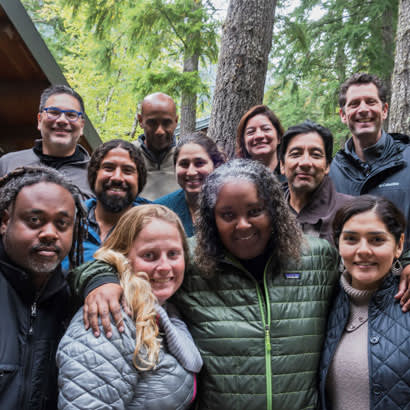
In March 2016, 35 grassroots organizations came together for the first-of-a-kind discussion among civil rights, environmental justice, health equity and grassroots conservation organizations pursuing a shared vision of a more diverse and inclusive culture in managing and preserving our nation’s public lands and waters.
Most members of this group, the Next 100 Coalition, represent communities of color that have consistently found themselves on the fringes of opportunity. It includes organizations that empower their constituents to realize their connection to the natural world and to understand how that connection can transform their lives and the lives of their families and communities. The Next 100 Coalition sees great opportunity in our public parks and waters, and is working to shape the next 100 years of conservation, public health and the economy.
Our existing concept of conservation is often limited to boundaries of national parks and monuments, and does not stretch to include young boys and girls from communities of color. This concept of conservation seldom veers off historic trails to connect Americans across our vast diaspora, providing common paths to our histories, cultures and experiences. These conversations are long overdue, and often expose harsh truths about us as a nation.
Achieving Our Shared Vision
The Next 100 Coalition seeks green justice in the neighborhoods where people of color and low income live, learn, work, play, pray and age. The joys of playing in the park, soccer after school, biking and walking on safe paths to parks and schools, and physical education in schools are important to provide the health benefits of the great outdoors on a daily basis. Trips to far away mountains, beaches and rivers are fun, healthy and educational, and go hand in hand with diversity, inclusion and green justice closer to home.
Coalition members, such as Outdoor Afro and Latino Outdoors, are encouraging African-American and Latino residents to find their place in nature. Groups like the Greening Youth Foundation and Hispanic Access Foundation are creating internships for minority youth, providing a more culturally diverse pool of candidates to serve as the next generation of stewards for the Earth and its people. In Colorado, Washington, Nevada and California, coalition partners have initiated local organizations under the same principles. The City Project and GreenLatinos are working on these shared values in urban, rural and wilderness areas, and are organizing civil rights, health equity and conservation leaders to stop construction of the border wall, based on its impact on people, places and values.
At the national level, the coalition is also working to articulate the need to expand opportunity and access to our parks and waters and to garner support for our shared vision with members of Congress on both sides of the aisle. The Next 100 Coalition members have testified before Congress to defend national monuments and the Antiquities Act, giving voice to millions of people, and have submitted public comments to the Secretaries of the Interior and Commerce Departments in support of maintaining the existing boundaries of our national monuments.
Due in large part to the coalition’s efforts, in January, the White House directed federal land management agencies and recipients of federal funding to work toward more diverse and inclusive action plans for managing our public lands and waters, and spreading opportunities to all communities. The directive encouraged these agencies and recipients to increase recruitment and retention of employees from marginalized communities; establish accountability systems for incorporating diversity and inclusion in programs and activities; collaborate with other agencies and recipients to broaden diversity and inclusion; create new opportunities to provide access to and enjoyment of parks and waters; expand public engagement in decision making; and begin implementation of action plans without delay. The Next 100 Coalition actively supports efforts to include these principles into strategic thinking and action by state and local governments; in companies in the outdoor recreation industry; in environmental organizations focused on public lands and conservation policy; and in public health organizations focused on equity.
While these initial efforts provide a good starting point, they are by no means sufficient. The coalition is working to establish a broader dialogue about increasing access of communities of color to public lands and making sure all of us can take advantage of the opportunities that parks and waters offer for better health and for professional and economic advancement.
Our society must continue to embrace and support the diverse ways in which we connect with nature. We must also make sure these ways reflect our ever-widening diversity. The opportunities afforded by our public lands and waters are a collective inheritance that belongs to all of us in the present and future. The Next 100 Coalition will engage our leaders to push for policies and programs that reflect our nation as it is, not as it was. And, as we confront the challenges that emerge as we broaden our reach, we will be buoyed by the knowledge that the Next 100 Coalition’s agenda represents the will of the people.
Kevin Bryan is Lead Organizer for Next 100 and Senior Policy Director, Keystone Policy Center. Robert García is the Founding Director-Counsel for The City Project/Proyecto del Pueblo.

